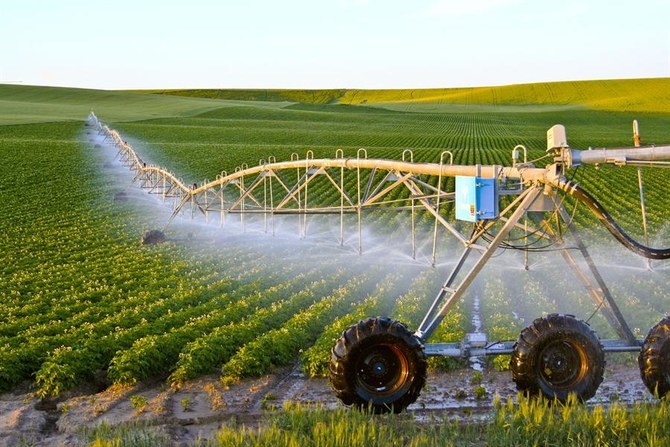RIYADH: As the global population surges, securing a stable supply of food and water has become paramount for a sustainable future.
Saudi Arabia, ever at the forefront of change, places this challenger at the center of its sustainability initiatives.
Driven by government entities and small to medium-sized enterprises, Saudi Arabia’s food security landscape is experiencing notable transformations, with various stakeholders actively contributing.
“Over the past decade, Saudi Arabia has made significant strides in bolstering its food security,” Abdulaziz Al-Saud, CEO and co-founder of Barakah, a Saudi enterprise focused on reshaping the food security scene, told Arab News.
Al-Saud emphasized the Kingdom’s initiatives to diversify and localize food sources, reducing dependence on imports.
“This involves significant investments in agri-tech and the acquisition of overseas farmland,” he noted, adding: “Technological adoption has been equally central to this advancement.”

Abdulaziz Al-Saud, CEO and co-founder of Barakah. (Supplied)
Al-Saud set out how modern agricultural techniques have been employed to enhance local production, minimize water wastage, and boost efficiency in the agricultural sector.
The significance of these efforts was underscored when the Kingdom’s General Authority for Statistics reported self-sufficiency in the production of dates, dairy products, and eggs in September.
These figures also revealed that Saudi Arabia produces more than enough of these three food items to meet local demand, meaning it has excess capacity for export.
Al-Saud also spotlighted the Kingdom’s commitment to addressing global food supply challenges, referencing the Ministry of Environment’s recent launch of a $10 billion action plan.
“The Kingdom also managed to reduce water usage for agricultural purposes by over 40 percent, addressing one of our key challenges – water scarcity,” he said.
“In 2022 alone, the agricultural sector witnessed a growth of 7.8 percent compared to the previous year, underscoring the positive impact of our food security strategies,” he added.
Sky Kurtz, CEO and founder of Pure Harvest Smart Farms — a leading UAE-based agri-tech enterprise — shed light on additional Saudi initiatives poised to redefine the future of food security.
“Saudi Arabia has been extremely proactive to advance food security, with both offensive and defensive policy measures,” Kurtz told Arab News.
“For example, the Kingdom imposed and has been raising import tariffs on various food products as a means of protecting domestic producers and improving their competitiveness for the local market,” he added.
He also referenced Saudi Arabia’s Agricultural Development Fund, which has implemented rigorous initiatives to fuel the sector’s advancement.

Sky Kurtz, CEO and founder of Pure Harvest Smart Farms. (Supplied)
“When we look at the development and support of sectors we operate in with Pure Harvest, we’ve seen significant progress from dedicated initiatives, programs and entities to support the industries that are best equipped to address food security and import dependency challenges in the Kingdom,” Kurtz added.
Being a main driver of economic prosperity, technological solutions have also played a significant role in addressing food security challenges.
Al-Saud explained that Saudi Arabia has invested heavily in precision agriculture, harnessing data analytics, drones, and Internet of Things to monitor crop health, manage irrigation, and control pests.
“This has resulted in enhanced yields and significant conservation of resources. The Kingdom’s turn to soil-less farming techniques like hydroponics and aquaponics enables food cultivation in controlled environments, dramatically conserving water and ensuring consistent production regardless of seasonal changes,” Al-Saud added.
Additionally, reducing food waste is pivotal for a sustainable future.
“Barakah is a prime example of this, with its online marketplace connecting food retailers with surplus inventory to consumers in Saudi Arabia, ensuring efficient utilization of food and promoting its sustainable consumption,” Al-Saud stated.
Approximately 20 percent of food waste happens in households, making awareness and educational campaigns vital, according to Barakah’s Al-Saud.
“The progressive synergy between food systems and technology, exemplified by Saudi-based ventures like Red Sea Farms, Mowareq, and Barakah is paving the way for a more sustainable and secure food future for Saudi Arabia,” he stated.
Kurtz further illustrated the significance of small and medium enterprises in tackling the multifaceted food security challenge.
“Governments and large companies simply cannot solve every problem by themselves, and often don’t have the agility and flexibility that SMEs bring,” he said.
“As we’ve directly set out to do with our business, SMEs can identify and solve for very specific ‘pain points’ and create businesses to capitalize upon these opportunities, including in food security,” Kurtz added.
Kurtz further noted that SMEs have the ability to develop solutions that are pivotal in transforming the current food system.
“Often backed by risk-seeking capital willing to take risks and trial new, innovative technologies, business models, etc. SMEs are essential to improving food security and changing the status quo – all contributing to and even driving forward the region’s economic growth and diversification ambitions to tackle the biggest challenges of our time,” Kurtz stated.
Al-Saud emphasized that investing in innovation across various sub sectors is crucial for addressing overarching challenges.
“By investing in innovation in key areas such as water desalination, efficient irrigation technology, protected agriculture, hydroponics, plant breeding and soil restoration, Saudi Arabia will provide commercial solutions that can be readily deployed to build resilient arid land agricultural systems worldwide,” he added.
According to Al-Saud, the Kingdom’s institutions are proactively moving to harness these technological advancements.
The Saudi Green Initiative plans to plant trees in soils produced by Saudi-based composting companies such as Edama. This supports the local supply chain and facilitates the construction of monumental projects like the King Salman Park in Riyadh.
Furthermore, NEOM intends to construct the world’s most sustainable food systems using technologies developed at King Abdullah University of Science and Technology.
Al-Saud underscored the remarkable degree of cross-sector collaboration in the Kingdom, suggesting that this integrated approach might be challenging to replicate globally.
“Looking ahead, Saudi Arabia is continuing to invest in technology and fostering international partnerships to strengthen its food security framework further,” he said.
“This holistic approach encapsulates Saudi Arabia’s journey towards enhanced food security and its continued commitment to addressing the challenges that lie ahead,” Al-Saud added.
With the Middle East and North Africa Climate Week set to unfold in Riyadh from Oct. 8-12, global leaders are converging to deliberate on the region’s active measures and achievements in sustainability.
Workshops, panel discussions, and fireside chats will be featured at the summit, covering topics related to climate, food security, and beyond.






















